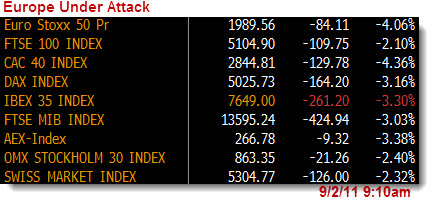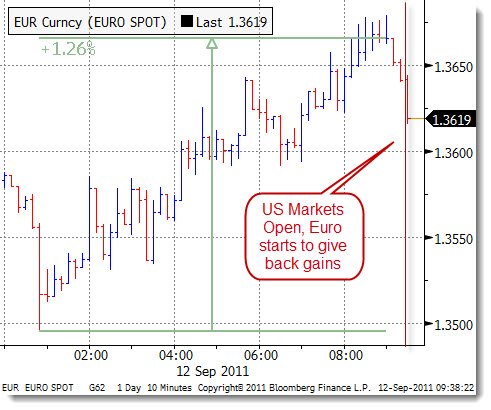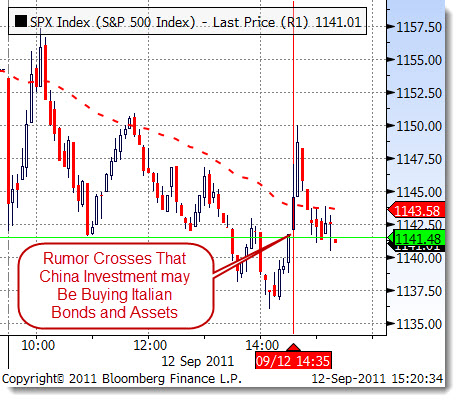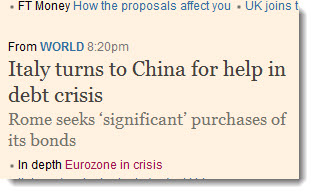During the month of September, we are going to be adding a special section to this site.
The TDI Managed Growth Strategy provides a private “client-only” blog where we discuss the day and our general outlook. Areas that we cover range from current holdings analysis, economic reports, political commentary and more.
The primary purpose of the “client-only” blog is provide information so that clients for whom we manage money will have a better understanding of what is the rationale for portfolio decisions. In addition, the information is designed to be educational so that readers can learn from both our mistakes and successes.
On a daily basis, simply follow www.thedisciplinedinvestor.com or use an RSS reader and point it to : http://tinyurl.com/3u3jahy or http://www.thedisciplinedinvestor.com/blog/category/stocks/insideedition/feed/
The EuroZone is under attack again into their afternoon trading session. Equity markets have been ht with a double dose of bad news. First there is the no confidence vote on the Greece plan to shore up its budget shortfall. The most recent derivation of the plan was to add a new property tax on real estate and freeze all municipal salaries:
Greece‘s cash-strapped government said Sunday it would impose a new property tax on top of existing austerity measures, to compensate for a revenue shortfall that is threatening to disrupt its vital international bailout program.
The government also decided, in a symbolic move aimed at a public angry at politicians, to dock a month‘s pay from all elected officials ”” from the head of state to the country‘s 325 mayors.

The Euro somehow caught a bid in the early part of the day and ran higher into the open of the U.S. markets. The best excuse for this was the technical bounce off of the $1.35 level.

As the Euro rallied, there was a good deal of confidence that seemed to build in the early goings of the trading day. We noticed that there was a dislocation between what was occurring between of Europe and U.S. markets. For whatever reason, there was a change of heart and investors decided to buy in to U.S. equities.
Perhaps it was as simple as a rotation out of any Euro area position and into other global equities. What we saw was an opportunity to cash in on profits from the European short and look to reestablish the position if the trend warranted. We took down 75% of the position for a gain of over 20%. It is important to note that there was limited volume on the day through 1pm and that was providing little evidence that there was conviction in either the early rally of the sell-off throughout the day.
By the time 1:30pm rolled around, there was a sharp move down for the Euro. Now trading below $1.356 and off by .66% for the day, markets started to unravel. We are closely monitoring the situation as there are a couple of key points that are going to be important. One being 1,136 on the S&P 500. If there is a move below that, it would set-up a retest of the August support of 1,120/1,122. A break below that would have the August low of 1,101 in target.
Just when it looked like there was the potential for a market breakdown, an amazing thing occurred. A headline crossed that China Investments (possibly a sovereign fund) would be buying bonds and assets of Italy. This pushed down the U.S. dollar and created a short squeeze in equity markets. After just a few minutes, when the source could not be identified, markets gave back all of the gains.
That same story magically appeared to hit the headlines again at 3:25pm on CNBC, reversing the course of stocks and currencies once again. Equities popped as this appeared on the Financial Times website:
WOW! This is news? Italy needs to sell their bonds is news? Whatever the reason, there was a short squeeze into the close as the U.S. dollar was slammed and the Euro moved higher. With the potential for a market moving bond auction by Italy on Tuesday, there is some thought that it may be a better idea to flatten positions overnight. This is what appears to be the simple reason behind the entire universe of stocks vaulted higher from 3:30pm until the close.
 This is suspicious at best. These kinds of specious rumors making their way through the media on the day before Italy is looking to raise close to $10 billion in a bond auction has got to raise an eyebrow or two. Several times over the past few months we have been told of China’s desire to participate in the fixed income markets for some of the troubled EuroZone countries, only to find that it is later denied by Chinese officials. This report, authored by Guy Dinmore, had little facts and no corroboration by an actual source.
This is suspicious at best. These kinds of specious rumors making their way through the media on the day before Italy is looking to raise close to $10 billion in a bond auction has got to raise an eyebrow or two. Several times over the past few months we have been told of China’s desire to participate in the fixed income markets for some of the troubled EuroZone countries, only to find that it is later denied by Chinese officials. This report, authored by Guy Dinmore, had little facts and no corroboration by an actual source.
Here is where I have a problem: Anything that was leaked related to such a plan would surely boost confidence, raise prices and that is not in the best interest of the potential buyer. If China was going to be purchasing bonds, why in the world would they leak the information?
This is reminiscent of times in the past when countries would put out stories that were later denied. All of this is aimed to boost confidence and had very little substance. (Note: This is why EuroZone debt is being shunned as there is little confidence remaining after a long series of “misrepresentations” have been found)
A few examples:
- Greece on Wednesday denied press reports it had mandated Goldman Sachs to sell bonds to China, but its debt chief reiterated a roadshow in Asia was in the pipeline. January, 27 2010 (CNBC)
- China offered on Saturday to buy Greek government bonds in a show of support for the country whose debt burden triggered a crisis for the euro zone and required an international bailout. October 10, 2010 (Reuters)
- OK, take this with a huge grain of salt, but the rumor is that China is about to bail out Europe or some such.This is driving stock futures higher and lifting the euro. June 16, 2011 (WSJ)
- Asian investors including the Chinese government are expected to represent a “strong proportion” of the buyers of Portuguese bail-out bonds when the eurozone‘s ‚¬440 billion rescue fund begins auctioning them next month, according to senior fund officials. May 25, 2011 (Financial Times)
And the references can go on and on…
Italy‘s centre-right government is turning to cash-rich China in the hope that Beijing will help rescue it from financial crisis by making “significant” purchases of Italian bonds and investments in strategic companies.
According to Italian officials, Lou Jiwei, chairman of China Investment Corp, one of the world‘s largest sovereign wealth funds, led a delegation to Rome last week for talks with Giulio Tremonti, finance minister, and Italy‘s Cassa Depositi e Prestiti, a state-controlled entity that has established an Italian Strategic Fund open to foreign investors.
Italian officials were in Beijing two weeks ago to meet CIC and China‘s State Administration of Foreign Exchange (Safe), which manages the bulk of China‘s $3,200bn foreign exchange reserves. Vittorio Grilli, head of treasury, met Chinese investors in Beijing in August. Italian officials said further negotiations were expected to take place soon.
The possibility of Chinese investment comes at a critical moment for Italy, as markets demand increasingly high yields to buy Italian public sector debt, projected to reach 120 per cent of GDP this year, a ratio second only to Greece in the eurozone.
Mr Tremonti has written extensively in the past about his fears of China‘s “reverse colonisation” of Europe. But he has been driven to seek new alternatives as Europe prevaricates over strengthening its bail-out fund and the European Central Bank warns that its month-old bond-buying programme cannot go on indefinitely. In a reflection of Italy‘s refinancing problems, the treasury on Monday sold ‚¬11.5bn of short-term notes at higher yields.
European analysts were cautious over the outcome of talks. Despite Beijing‘s numerous expressions of confidence in the creditworthiness of countries such as Greece and Portugal analysts say Chinese purchases of peripheral European debt have been relatively small.
How much of Italy‘s ‚¬1,900bn of debt is already held by China is unclear, though one Italian official told the FT that Beijing held about 4 per cent.
Italy‘s debt crisis has forced the government to consider possible sales of strategic stakes in companies such as Enel, the Italian power utility, and Eni, the oil and gas multinational.
Cassa Depositi e Prestiti is a founding member of the informal “long-term investors club” along with similar institutions in France and Germany. In July it launched its Italian strategic fund with an investment of ‚¬4bn that it plans to expand to ‚¬7bn with participation from other sources, including foreign institutional investors.
CIC was set up in 2007 with capital of $200bn and its assets under management now total about $410bn. It says it “maintains a strict commercial orientation and is driven by purely economic and financial interests” and that it is committed to “high professional and ethical standards in corporate governance, transparency and accountability”. China‘s embassy in Rome had no immediate comment.
The highlighted areas show that it is Italy courting China, not the other way around. Moreover, the assumptions and conclusion of the author are anecdotal, at best. What this really shows is that investors are deathly afraid of any action that may cause an outsized move move against them (shorts) or without them (longs). For now, this should be treated as a speculative rumor with no long-term impact on the situation.
At the end of the day, we added back to the short Europe (EPV) to a 5% (10% synthetic) position. This is much lower that was held just a few days ago when it was a 28% position. As the recent rumor of China fades and the crisis continues to unfold, we will look to add back. Right now, there is a potential for a quick relief rally over the next few day and it will be best to assess the potential downside/upside as it plays out.
Tomorrow the Peru position will be discussed as well as a quick summary of the equities held.
___
Latest Podcast Episode: TDI Podcast: Should I Sell, Buy, Cry? $450,000 PER JOB? How To Hedge (#229)
___


















